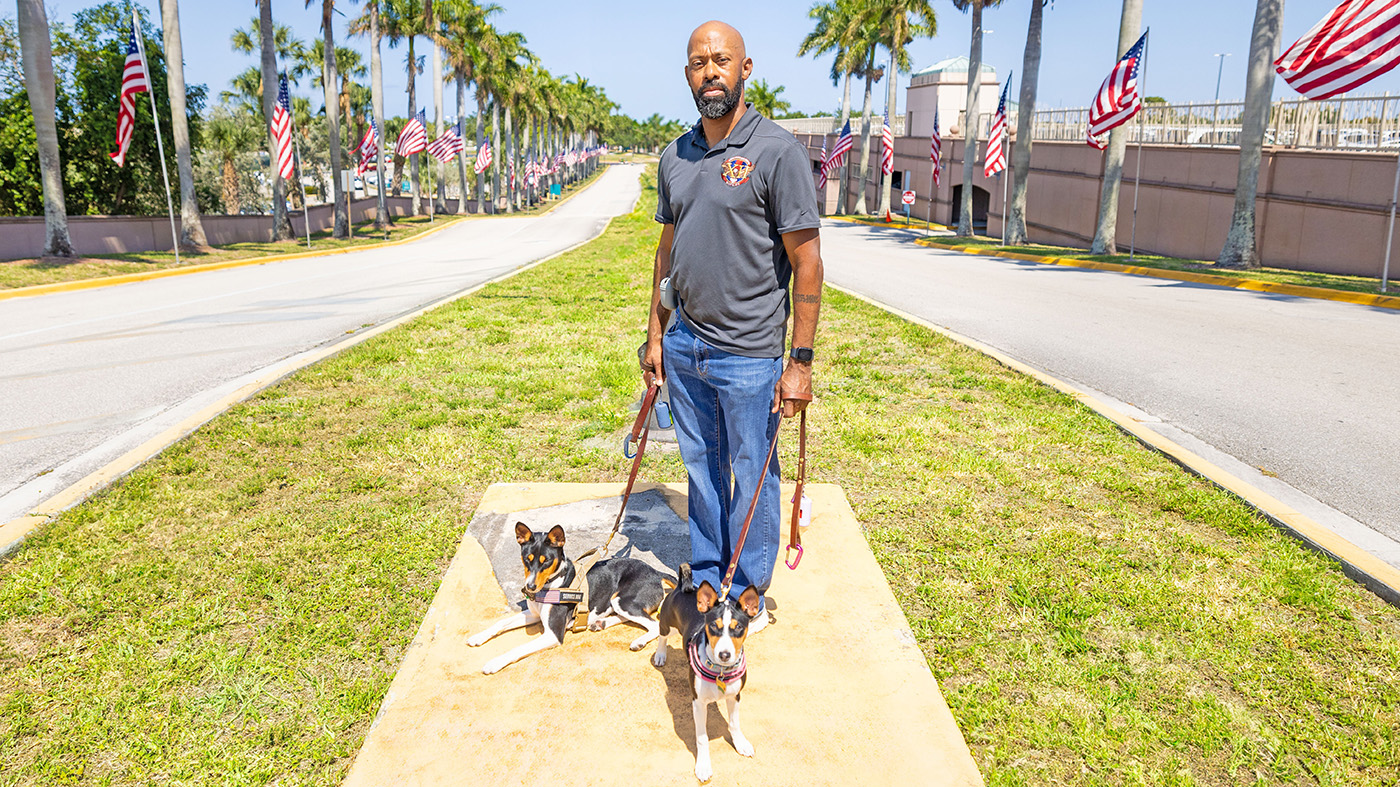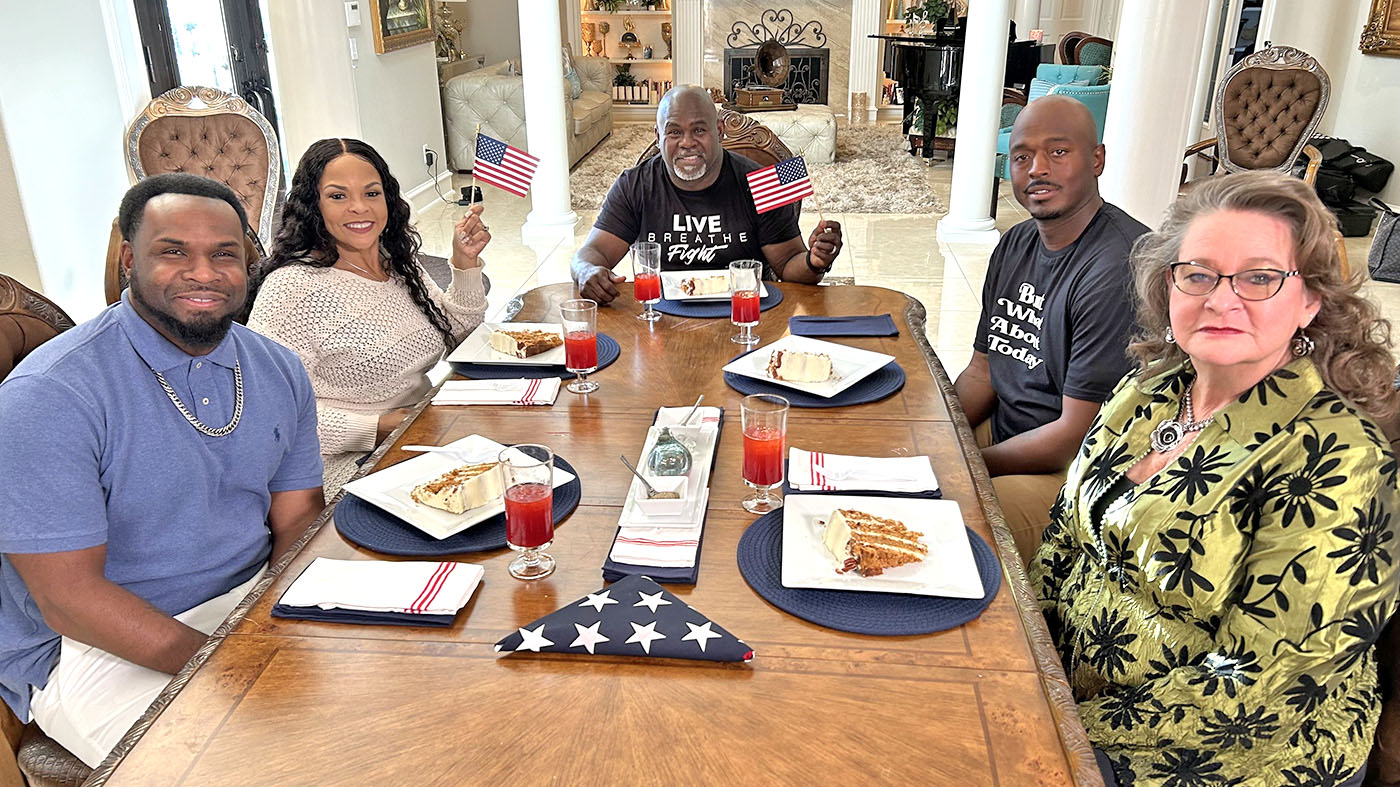After 30 years in the Marine Corps, Ramon Gallimore faced a new battle off the field: living with post-traumatic stress disorder (PTSD).
From his early years growing up in the Bronx to his multiple deployments and recruiting duties, Gallimore’s journey has been marked by competence, resilience and a relentless pursuit of purpose.
Part of his pursuit was a unique, exclusive program offered by West Palm Beach VA known as Puppies Assisting Wounded Servicemembers (PAWS).
The PAWS program is a pilot aimed at supporting Veterans diagnosed with PTSD in a nontraditional therapeutic approach. The initiative involves training service dogs as part of a complementary and integrative health approach alongside other Veterans to overcome PTSD.
Veterans train the puppies to assist other Veterans, which helps in managing their own PTSD symptoms. The program is designed to explore the benefits of service dog training as a unique aid to existing PTSD treatments.
PAWS program brought better days
For Gallimore, PAWS has played a pivotal role in managing his PTSD, and it has rejuvenated his sense of purpose. “I had a real rough childhood, witnessing a lot of horrible things,” he shared, including the loss of his mother months before deployment.
When life slowed down, he was haunted by the loss of his mother and the horrors of war as he adjusted to being back home.
The PAWS program brought better days. “PAWS, with its VA involvement, seemed like it could be for me because I like dogs and working with Veterans, people who understand you. I always liked dogs and seeing service dogs with Veterans intrigued me,” he said.
Training service dogs for fellow Veterans allowed him to see firsthand the incredible impact these animals could have. “Seeing a service dog in action, like alerting a Veteran during a fire alarm drill, was incredible. It showed me the profound difference these dogs can make,” he said.
“It made me feel good to help others.”
Throughout his time training the service dogs, Gallimore experienced several significant moments that reinforced his belief in the healing power of service dogs. “Working with the dogs and handling them, seeing them respond to commands, was a breakthrough for me,” he said.
These experiences not only provided him with practical skills but also offered emotional and psychological relief. “It gave me purpose again. My PTSD episodes became shorter and my anxiety levels dropped significantly. It made me feel good to be involved in something that helps others.”
His story stands as a testament to the transformative power of the PAWS program and the hope it offers to Veterans.
Topics in this story
More Stories
Embrace simplicity and balance during the holiday frenzy! Discover the beauty of self-care and a nourishing meal in this week's #LiveWholeHealth practice.
Monica Diaz, executive director of the Homeless Programs Office, discusses the progress made in housing Veterans in 2024.
Mann Family Dinner episode discusses resources to address many of life’s challenges through VA’s Don’t Wait, Reach Out campaign.







I am the sister of a Viet Nam Veteran and alone. I am the one that his is help and working full time it is difficult. My brother has severe PTSD and loves dogs more than people. He had a stroke around 6 years ago leaving his left side (dominant side) papalized. I often wondered is a service dog would be of help to him. We live in Pittsburgh PA and suggestions. I am signed with the VA as communication.
Great read, Dogs truly are Mans best friends in all aspects. Veterans in those Va Hospitals enjoy touching and hugging a dog if possible. It brings tears of joy and no doubt healing if just for a few moments. Plus, our service dogs are awesome no matter what the Breed.
I was attached to 1stMP Battalion in Danang RVN. and we used them in quite a few situations as necessary.
Has the VA considered emotional support animals? I have a pet rabbit that’s been my go to in getting through day to day activities and curbing the thoughts of past traumas.
Talk to your VA MH provider ESAs help primary in residences only and VA can not authorize them for public travel.
Dogs are a blessing to Veterans, even the ones who aren’t trained as Service Animals. I’d love to get involved with training these angels for Veterans. Thanks for this article and the thoughtful comments.
I agree. Sharing burdens and the remarkable story of focusing on something outwardly helps to take the focus off your own burdens. The total unconditional love and obedience of an animal is truly a miracle.
Iv trained dogs,for lot years strange situation happened in basic training hafmdxto leave conditions did not want to be cause new situation another recruit in same barrack but in army reserves bur later went to on to training dogs and working depot corrections and same sort situation duonosed with it d do threats with indy drill Sgt and asked to leave honorable discharge and in correction s lost myxreutement happen to be wrong place wrong g time at ft dix NJ but surepleasurezto see dogs are,as popular been training in competions,si nce I was 14 in obeyed field tracking want to go infantry be dog handler and said color blind later was not and redirected to different Mos when they walk up that line show the flip book with dots back in 1982 enlisted after left forgot about what happened continued to train dogs but in tracking obed and field completions and water tests with class incorrectly was good employee law suit and lost my retirement and came threat flat tires because bad staff and would not be good old boy turn my head like they asked of me in basic in order to keep honorable discharge great feeling working with dogs and the magic they work and only want the same in return last dog traded army ranger bull terrier in calif retired corrections taffy both symtate and federal Oakland pd long time friend flew,out from florid to train his dog paid my flight and use cars home trained morning night if could do it inb30 days dogs name was Alvin from the chicken monks and when vmcame back falling year worked twice day in 2014 never for got anything could visit family hour from his home in Tracy calif path finder came mefrom long line of military family dad African American to go from inlist to officer 25 year navy nieces nefews,west point and anabolic when I was called he had to find home for Alvin and trained well my friend got frustrated cancer and past away about 3 years later known since I was 16 and trained rottweielerfor hime when he worked at SanQuentin after got out service transfered to women’s facility federal prison at pleasantencalif.retired from did not get to his funeral but my brother worked place call genesis house drug alcoholic treatment men women in Vallejo my friend had side business black tie BBQ Alvin was fun to work
Dogs are a blessing to Veterans, even the ones who aren’t trained as Service Animals. I’d love to get involved with training these angels for Veterans. Thanks for this article and the thoughtful comments.
I am the East Lyme Veterans Representative and a member of the board for Forever In My Heart https://foreverinmyheartfoundation.org/ I am working with service members who have been prescribed by VA to receive a service dog for PTSD. It cost about $25,000 to $35,000 to train a certified service dog. I want to know how to access the funds from Public Law 177-35 PAWS to get to PTSD veterans.
Thanks for sharing your story Ramon. Your willingness to share your story and assist other Veterans is remarkable!
Brian,
The VA refers to PAWS as an unfunded mandate. Too bad because so many more Veterans could be served through the PAWS Act. if funding was made available.